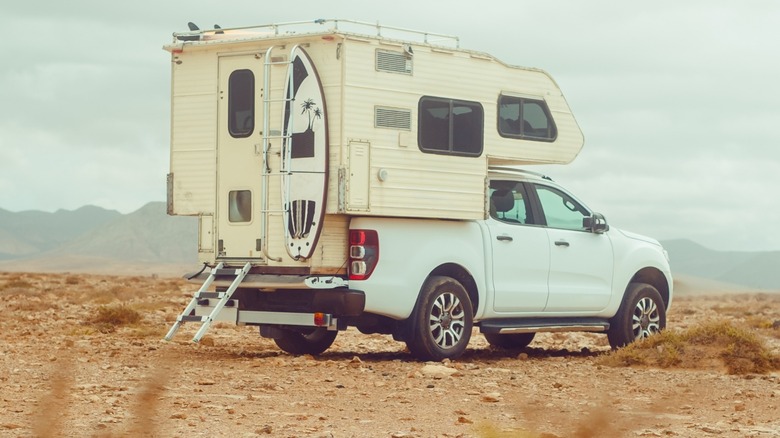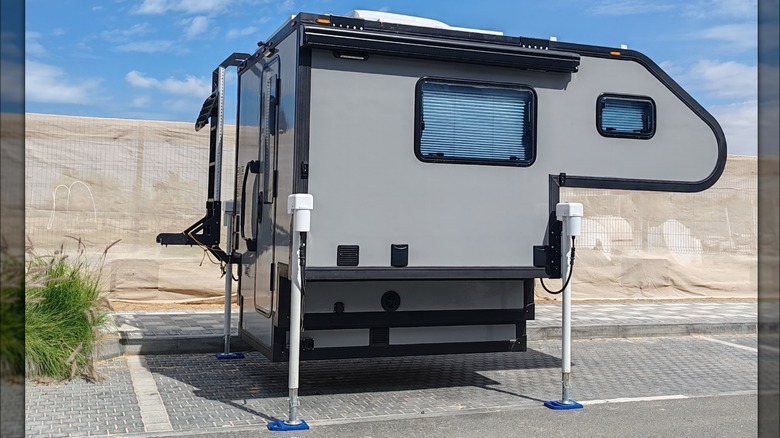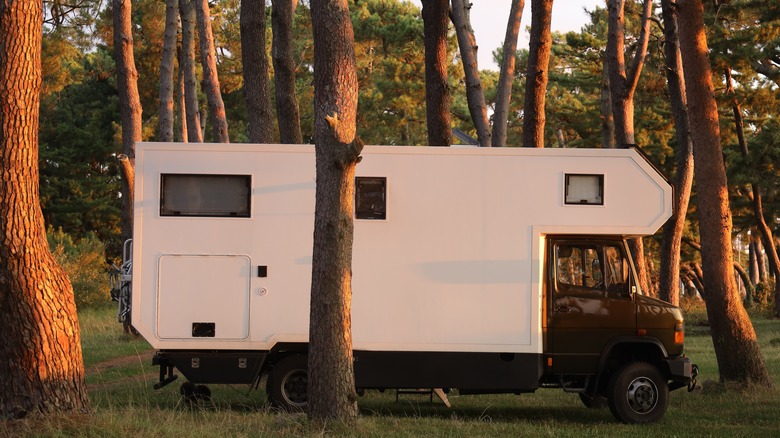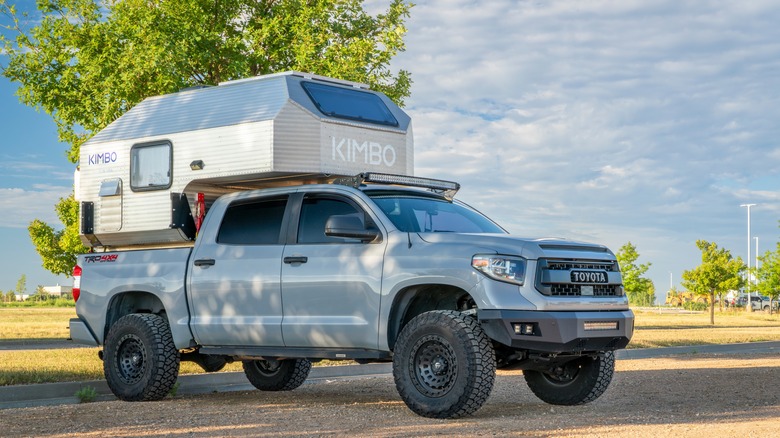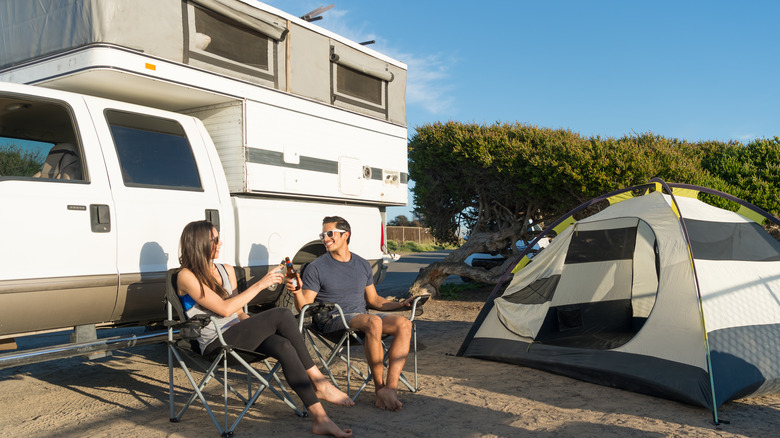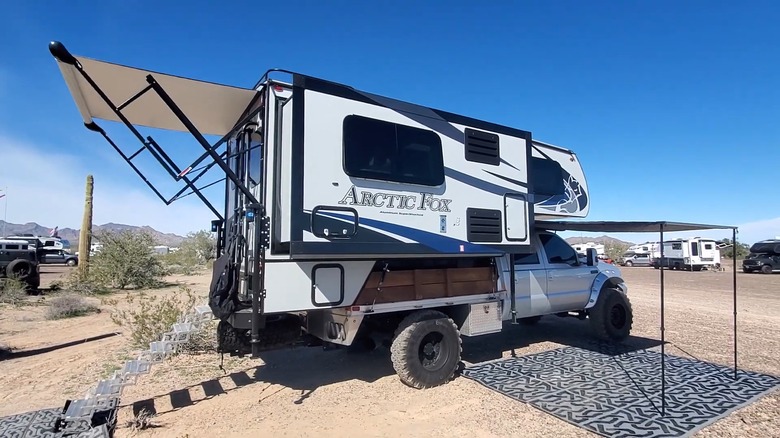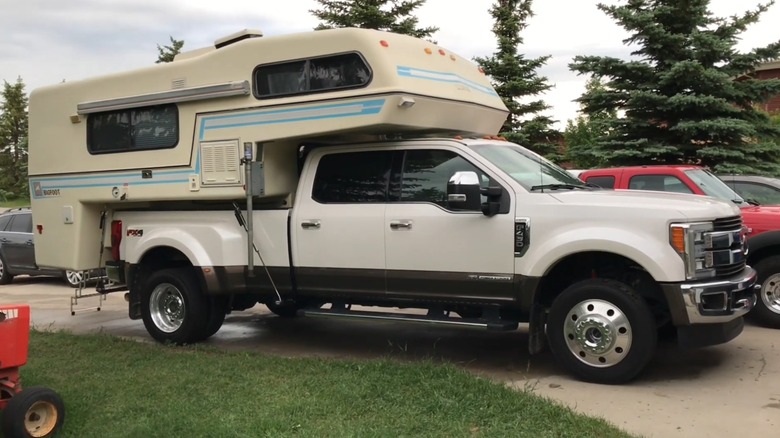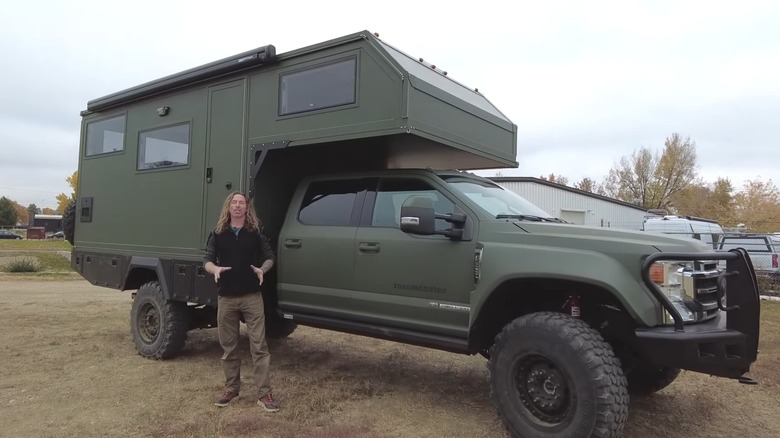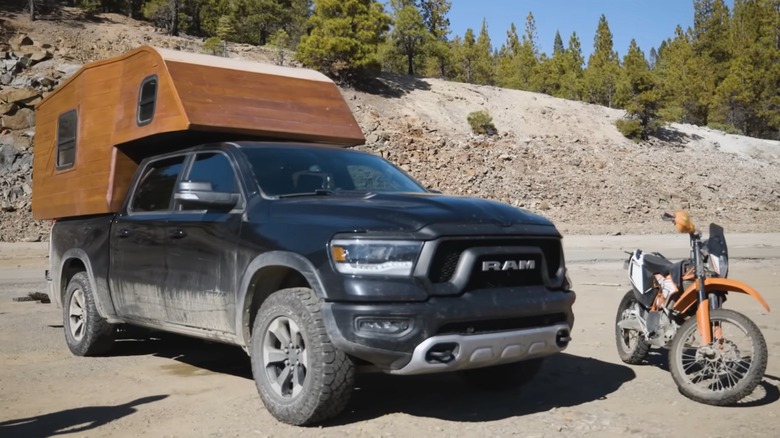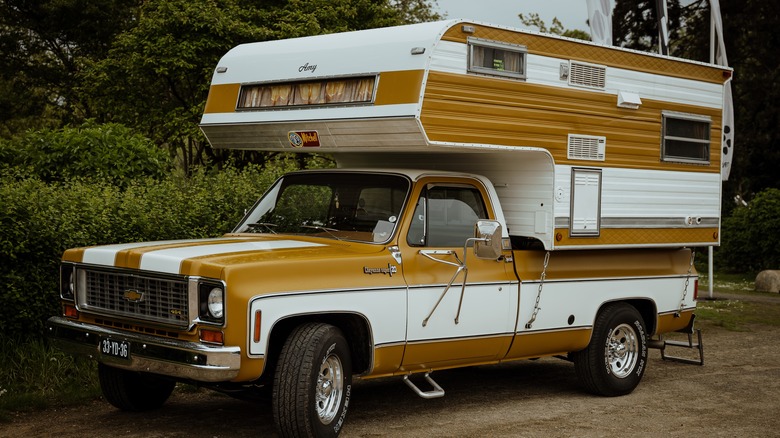Everything You Need To Consider When Choosing The Right Truck For A Camper
Sometimes there is nothing like getting out into the great outdoors. It may not be for everybody, but for many, the escape into nature is an incomparable break from the monotony or the stress of everyday living. However, nature breaks can come in wildly different forms, from staying in a luxury yurt on the shore of a mountain lake in Colorado to backpacking in the Great Smoky Mountains. Others might like to pitch a tent at the beach or rent a lodge in the African savanna, although some might argue the best escape happens when you can take your home with you literally in the back of your pickup.
Traveling and vacationing with a truck camper differs drastically from doing so with a motorhome or camper trailer and far outshines pitching a tent. Truck campers come in a variety of floor plans with a range of options from basic to premium, and they often provide a surprising amount of room and amenities. Furthermore, depending on the setup, truck campers can be set up independently at a campsite, leaving the truck as transportation apart from the shelter. But the inherent conundrum presenting itself once the decision to go with a truck camper can devolve into a kind of chicken and egg situation of which one to buy first and why, camper or truck. Assuming you want to scope out the selection of pickups first, here are some things to consider.
Is a truck camper right for you?
The purchase of either a truck or a camper represents a significant investment no matter the size or level of luxury. You have plenty of options in camping equipment available for any budget. Of course, anyone considering a camper is already past the idea of buying a premium tent, but considering whether a motorhome or trailer is most appropriate for your particular needs should be part of the process.
Motorhomes can be a comfortable and practical way to travel while providing a high level of amenities and ample space. But if your plans involve any kind of rugged trail driving or ascending narrow mountain roads, a motorhome is all wrong. Furthermore, once it is set in place, so is your ride, making emergency runs to the store a major hassle. Camper trailers can offer the same levels of comfort and convenience while providing for local transportation away from the campsite, but towing a trailer brings with it a long list of other considerations bringing possible travel headaches with it.
For the best of both worlds, a truck camper can be ideal, particularly if it can be detached and left at a campsite alone. It may not offer as much space, but the right combo of truck and camper can get surprisingly close. Additionally, you can enjoy better access to parking and camping, fuel economy, and fewer restrictions to parks, beaches, and more.
Where are you going and who's coming?
Potential destinations should play an outsized role in choosing your truck. Setting aside any requirement a camper may have for the truck, consider where you will be driving. This will help determine whether you need a four-wheel-drive (4WD) or not, and how important fuel economy is. For those legendary coast-to-coast tours heading through remote parts of North America, an economical truck can aid in keeping expenses down, and while they cost more at time of purchase, diesel engines are inherently more efficient engines than their gasoline counterparts.
No matter where you go, whoever might accompany you should also play an important role. For your young family of four, you will want a crew cab as an extended cab will be cramped, and a truck filled with extra options such as rear seat entertainment could cut the tension of long runs across Montana or Texas. Any parent knows that restless kids on long stretches of highway can try the patience of even the calmest parent. However, the size of truck will also determine the camper size, so accommodations for four will likely necessitate a larger and more capable truck from the start. Also, no matter what truck and camper you choose, doorways can be higher and little kids may have trouble getting in and out. While not necessarily a crucial factor in choosing a truck, that is one of the little things you might not think about until the first time at camp.
Which came first, the camper or the truck?
In a classic chicken and egg scenario, you could be choosing a truck for a camper or choosing a camper for a truck. One big exception is that you already have a camper for whatever reason and are now in the market for a truck to go with it. Obviously, that will limit your options to those models that fit within that camper's specifications.
Truck campers are made to fit mid-size, full-size, or flatbed pickup models. A single cab will provide the longest bed at eight feet, but you better have plans for camping as a duo only. Regardless, campers can be bought to accommodate even the shortest mid-size bed at just five feet. Truck Camper Magazine recommends starting with a choice of camper first if you currently own neither. This will give you the most flexibility, and you can get the camper with all the amenities you need or desire and then choose a truck to match. Since the campers are all made to work with existing pickup models, any camper you choose will work with something.
Highly important to an acceptable outcome is proper matching of the truck, and calculations on the size of the bed along with payload capacity using estimates for the weight of your gear, occupants, and supplies need to be considered. In lieu of exact calculations, shooting for a payload capacity far exceeding a rough estimate may be a feasible option.
Brand and budget
Some people, for better or worse, buy one particular brand and stick to it no matter what. For them, driving anything other than a Ford, for example, is inconceivable. There's not a thing wrong with having brand loyalty. But many are more interested in getting value for money than swearing fealty to a faceless corporation. And with manufacturers offering a wider selection of unique features than ever, it is up to them to deliver something worth buying.
Before venturing any further, it is probably a good idea to mention the fact that EV pickups are generally not well-suited for outfitting with a camper. The reasoning can get into the weeds, so that topic can be saved for another day. For an appropriate combustion engine truck, you can choose from all the major manufacturers, and various models from GMC, Ford, Ram and Toyota have become more luxurious than ever. Also, while you can't buy an Isuzu pickup in the United States, its commercial cabover NPR, available in single or couple cab, makes an interesting choice for a flatbed setup.
Setting your budget totally depends on your financial situation, although new trucks are pricey these days. The two cheapest pickups in 2024 are not suited for a camper, the Hyundai Santa Cruz and Ford Maverick XL. This leaves the entry price at $30,695 for a base Chevrolet Colorado. But for full-size luxury, the 2024 GMC Sierra 1500 Denali Ultimate will set you back about $85,000.
Gasoline or diesel power
One of the most crucial decisions made in choosing the perfect truck for your camper is what engine will be powering it. Carefully weighing the pros and cons of each engine type and settling on the right option will pay dividends in the long run, avoiding the risk of wanting to trade it in later and losing money from the inevitable depreciation.
Should the ideal setup for you rise above a certain total weight assuming a full load with supplies and passengers, a diesel truck will be the obvious choice and possibly the only choice to some degree. Camper setups that fall within the middle of the range are the ones that will require some consideration. Diesel engines cost more to purchase and can add several thousand dollars to the price tag. However, they offer better fuel economy, especially when fully loaded — similarly equipped pickups can differ up to 5 mpg. While higher economy is beneficial, in the United States, diesel fuel usually costs more, possibly negating any cost savings from the better economy.
If you plan to own your camping rig a long time, diesel is likely the better choice as it will last longer. If your rig is heavy, diesel is possibly the only choice. But for situations in-between, the savings from running with gasoline are likely to be enough to forego any potential diesel benefits.
Dually
While you may have a well-equipped camping rig picked out with one of the top-end campers featuring multiple slide-outs, full bathroom, and ample space, you might have one more option to choose from. For those ultimate truck campers, heavy duty trucks with big and powerful diesel engines are not just the norm, they are essential. But even with a stout truck, will you have enough support with single rear wheels, or is a dually more appropriate?
Trucks equipped with two wheels on each side of the rear axle are commonly called a dually. They have flared fenders to cover the extra tire, and the additional wheels provide support for significant payload capacity and extra grip. They also add cost to the truck, and you might not even need a dually. Furthermore, the additional width can pose problems with clearance in some scenarios.
You won't find any hard and fast rule dictating when to go with a dually. This will be up to the total payload expected and the capacity needed of the truck. But take note that if you are near payload capacity and might want to pull a trailer at some time, the dually can make that possible.
Do you need four-wheel-drive?
The choice of having only your rear wheels doing the work or having the ability to send power through all four depends very much on how you plan to use your truck and through what conditions you will take it. Furthermore, while you may think going for the cour-wheel-drive model is the best option, a two-wheel-drive might be the better option.
For overlanders looking to be off-grid and wind through rugged mountain passes, the four-wheel-drive truck is definitely the best choice. But for those who may only occasionally find themselves veering away from pavement, opting for this package could be wasteful. Placing weight over the driving wheels of a pickup increases traction, meaning the mere existence of your camper will already give you added grip, and this is enhanced if you have a dually. Additionally, four-wheel-drive components are heavy and reduce your payload capacity, meaning you are sacrificing the ability to pack extra supplies for a feature you may rarely use or not ever need. With the cost of a four-wheel-drive package running several thousand dollars, you might find it hard to justify the expense unless your plans absolutely require it.
Unorthodox alternatives
Most advice you'll receive, including this article, is meant to aid in picking the right equipment found at the dealership for both truck and camper. But just for the sake of variety and to consider those with a creative bent, the dealership is not the only place to find truck campers. Some people build them instead, and if you are crafty and like a challenge, you can not only build a unique camper to your liking, your choice of trucks becomes far less limited.
Custom builds or installations open up possibilities depending on your goals. Buying a classic Mercedes Unimog, a German military truck with intense off-road capabilities, can be a good base for an extreme wilderness-conquering camping rig, and some campers can be adapted to fit with little modification. Taking creativity to new limits can have you converting an old European fire truck to fit a custom camper, just as one family featured in Truck Camper Magazine did with theirs. Building from scratch also offers amenities not possible in a unit chosen off the shelf, just like this rig almost resembling a spacecraft on the back of an old Jeep Comanche.
No standard advice can help you choose the right truck for a project like one of these. These are just examples of what can be when you let your mind wander. However, all of them take considerable time and effort, so only attempt such an endeavor if you are fully prepared to commit.
Used trucks
One more thing to consider while searching for the perfect truck to complete your truck camper experience is the option to buy pre-owned. Having a brand-new truck on which to install your brand-new camper is ideal, but many of us have to consider our budgets with pragmatism and find a balance between the ideal and the feasible.
Therefore, in choosing a used truck for your setup, all the typical caveats for buying any used car apply. Check the service records, scan the obd2 port for error codes, perform a visual inspection, and when you find one that looks like it will work for you, have a thorough inspection performed by a professional. Many models of used truck should be avoided due to negative ownership reports, and if you do not plan for long-term ownership, some truck models have a higher resale value than others. Just do you due diligence before falling over your hard-earned cash.
As for camper requirements, they remain the same for new or used models. However, you should consider the added stress a camper will put on a used truck. One that is showing signs of wear in the engine, transmission, and suspension can rapidly deteriorate once it is suddenly subjected to heavy loads at all times. This is particularly prescient as an Axios study revealed that only a small percentage of truck owners actually used them for hauling anything.
